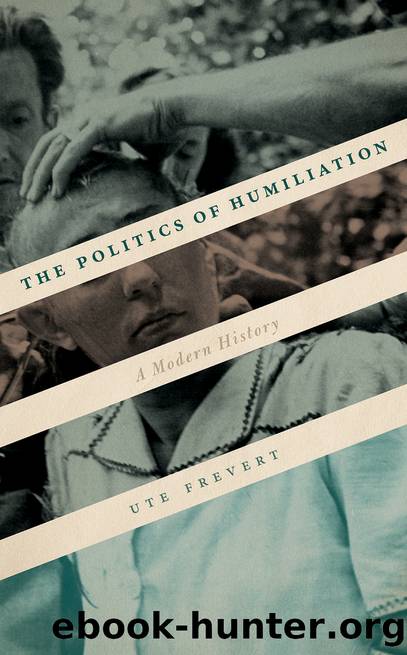The Politics of Humiliation: A Modern History by Ute Frevert

Author:Ute Frevert [Frevert, Ute]
Language: eng
Format: epub
Tags: history, Modern, General, World, 20th Century, social history, Social Science, Medical
ISBN: 9780192551924
Google: J8jXDwAAQBAJ
Publisher: Oxford University Press
Published: 2020-03-26T00:30:04.905551+00:00
The Berlin Kowtow Affair of 1901: Who Humiliates Whom?
The year 1901 put an end to all of that. After the Boxer Rebellion had broken out, the eight allied powers reacted with uncompromising military and political might. The Chinese government had to meet a series of draconian conditions: alongside harsh punishment for the attackers and their supporters, the allies demanded immense financial reparationsâand the explicit abolition of the kowtow for diplomats. In reality, this had been a non-issue since 1873. But the Europeans, Americans, and Japanese used the situation to emphasize once again the principle of âperfect equalityâ between sovereign states, âwithout any loss of prestige on one side or the otherâ.101
They were also unanimous about the first item on the list of conditions. It obligated the Chinese to apologize for the murders of the German ambassador Clemens von Ketteler and the chancellor of the Japanese delegation, Akira Sugiyama, who had both been killed during the rebellion.102 Speaking for the Germans, Secretary of State for Foreign Affairs Bernhard von Bülow had immediately made it clear that such an act of âexpiationâ was a âquestion of satisfactionâ and âa matter of national honourâ.103
Not long thereafter, Kaiser Wilhelm II received a telegram from the Chinese emperor, who âmost deeply lamented and regrettedâ Kettelerâs murder and stated that a drink offering would be made in his name. The emperor also sent the Japanese Tenno his regrets, arranged for religious ceremonies to be held for Sugiyama, and appealed to the long tradition of good relations and mutual respect between the two neighbouring countries. While the Tenno accepted the regrets âwith satisfactionâ and advised the emperor to appoint a new government, Wilhelm II was more guarded. He replied that he could not view the drink offering as âexpiationâ for the âmisdeedâ and made further demands.104
Fig. 18. Caricature of Wilhelm II demanding expiation in Punch, 10 October 1900
Download
This site does not store any files on its server. We only index and link to content provided by other sites. Please contact the content providers to delete copyright contents if any and email us, we'll remove relevant links or contents immediately.
| Africa | Americas |
| Arctic & Antarctica | Asia |
| Australia & Oceania | Europe |
| Middle East | Russia |
| United States | World |
| Ancient Civilizations | Military |
| Historical Study & Educational Resources |
Machine Learning at Scale with H2O by Gregory Keys | David Whiting(4292)
Never by Ken Follett(3937)
Fairy Tale by Stephen King(3370)
Oathbringer (The Stormlight Archive, Book 3) by Brandon Sanderson(3154)
The Man Who Died Twice by Richard Osman(3072)
Will by Will Smith(2908)
Rationality by Steven Pinker(2352)
Can't Hurt Me: Master Your Mind and Defy the Odds - Clean Edition by David Goggins(2323)
The Dark Hours by Michael Connelly(2300)
Friends, Lovers, and the Big Terrible Thing by Matthew Perry(2219)
The Dawn of Everything: A New History of Humanity by David Graeber & David Wengrow(2195)
Principles for Dealing With the Changing World Order: Why Nations Succeed and Fail by Ray Dalio(2036)
A Short History of War by Jeremy Black(1842)
HBR's 10 Must Reads 2022 by Harvard Business Review(1839)
Go Tell the Bees That I Am Gone by Diana Gabaldon(1753)
A Game of Thrones (The Illustrated Edition) by George R. R. Martin(1721)
Kingdom of Ash by Maas Sarah J(1668)
515945210 by Unknown(1660)
443319537 by Unknown(1545)
